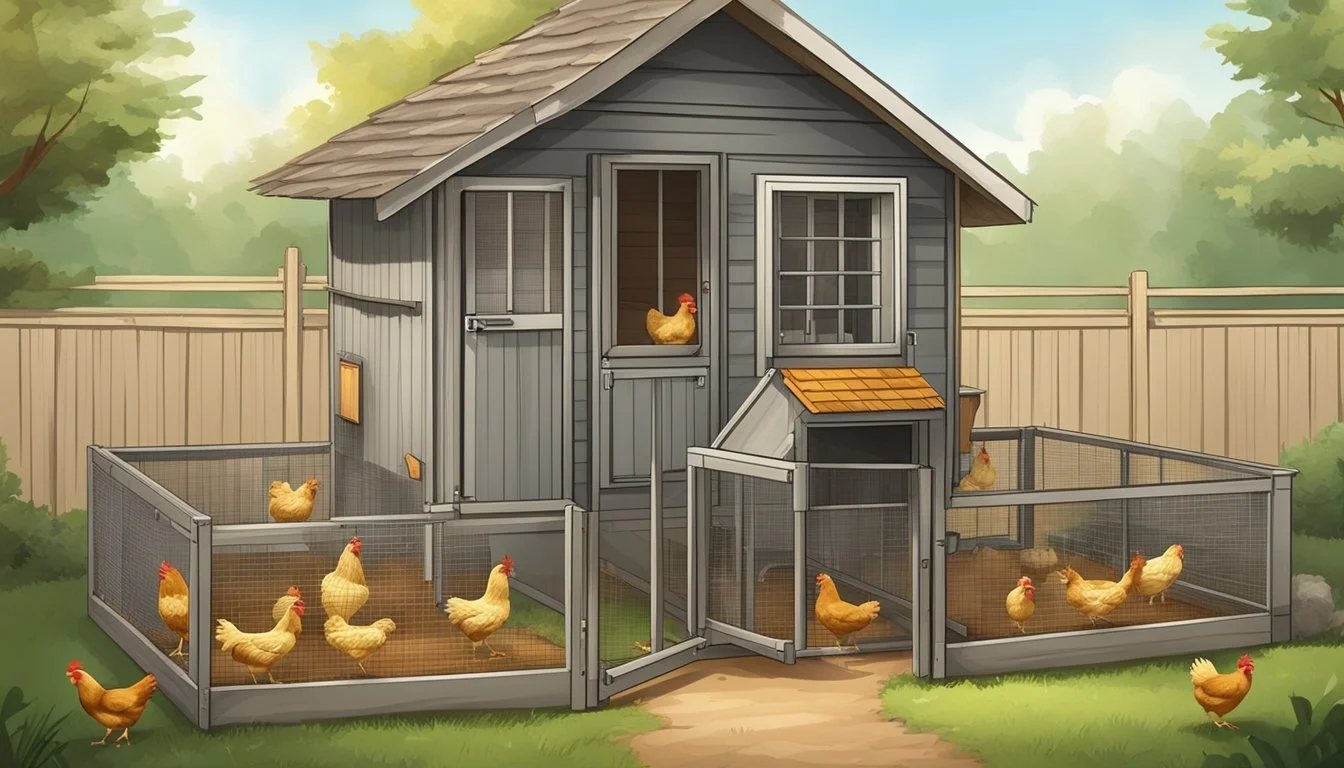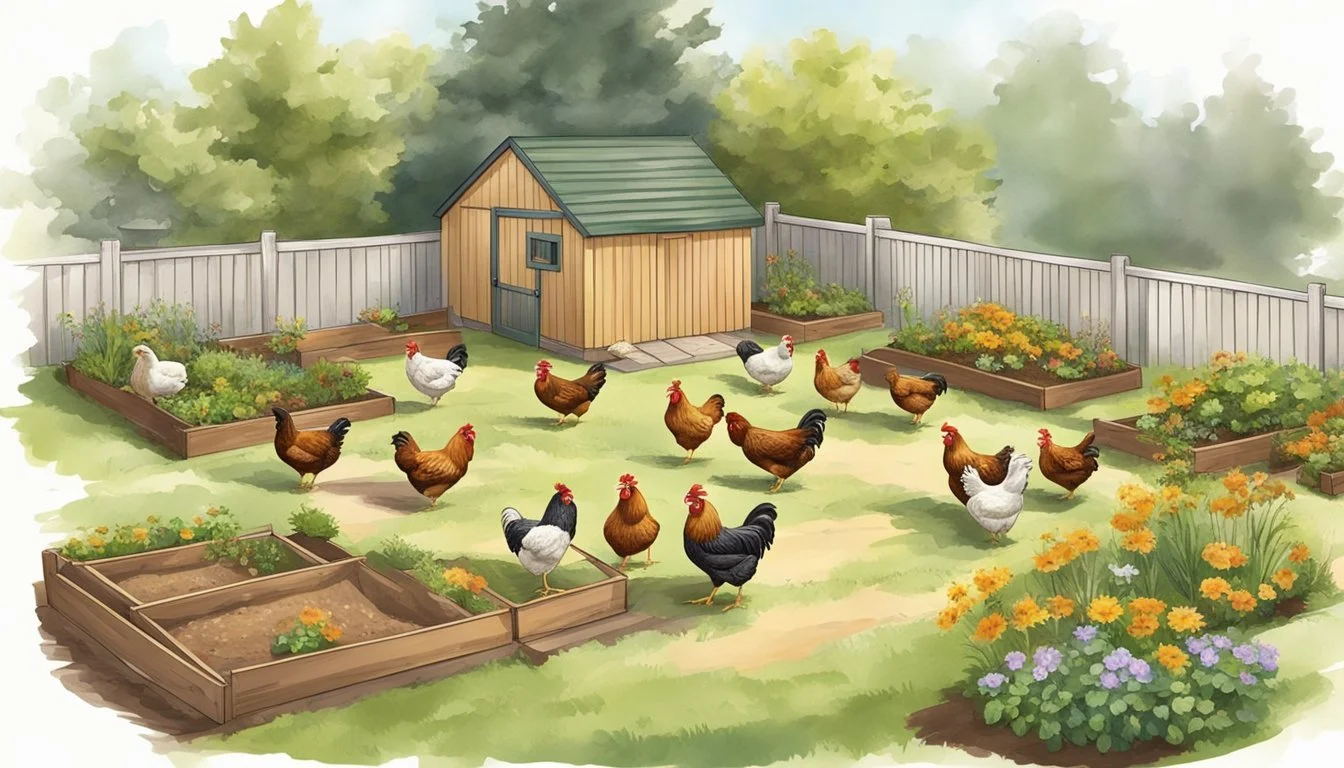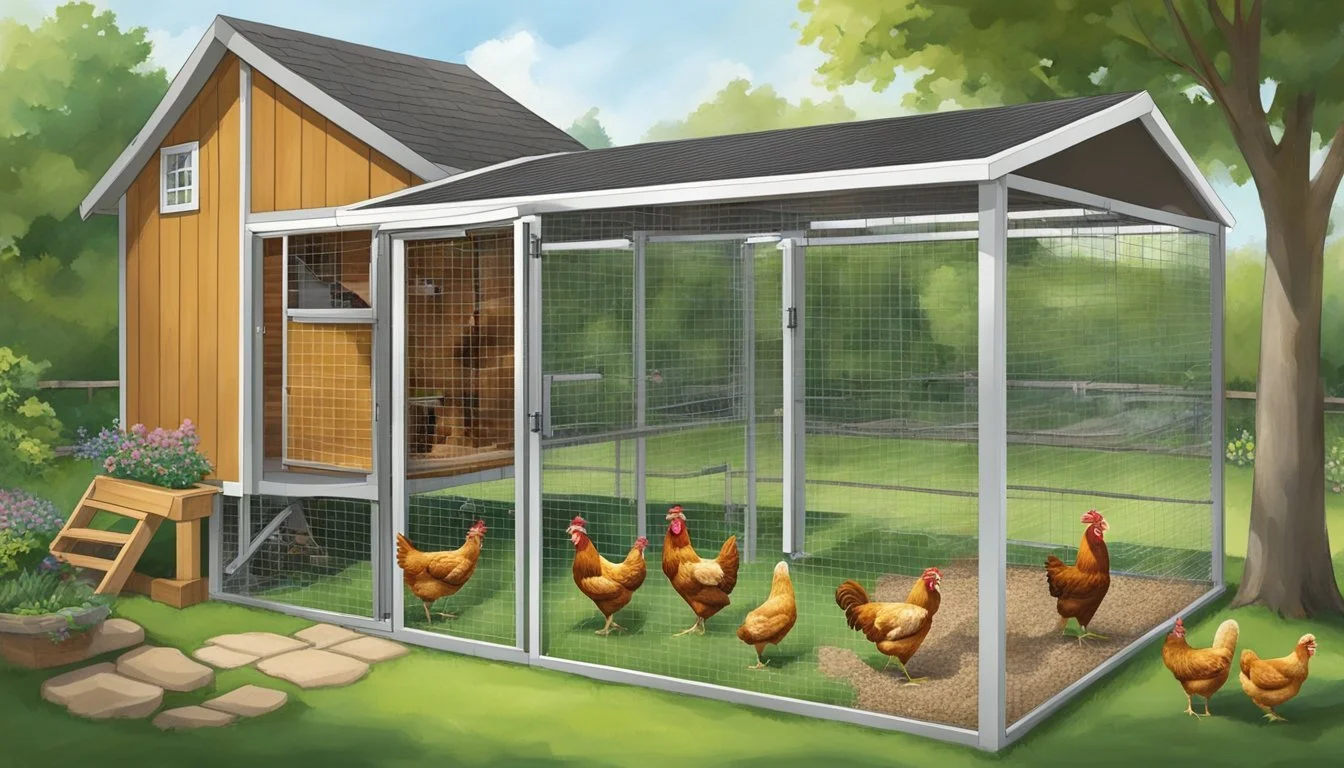Keeping Backyard Chickens in Carmel, IN
Essential Guidelines for Residents
The trend of keeping backyard chickens has spread to various urban and suburban areas, embracing a movement towards sustainable living and local food sourcing. In Carmel, Indiana, the local ordinances reflect a community that values both the benefits and responsibilities of urban agriculture. Residents are allowed to keep up to six hens in their backyards, a practice that has supporters who appreciate the opportunity to harvest fresh eggs, reduce food waste through natural composting, and enjoy the companionship of these domesticated fowl.
However, as with any city ordinance, Carmel imposes regulations designed to balance the interests of chicken keepers with the well-being of the community at large. To maintain neighborhood harmony, roosters, known for their loud crowing, are not permitted within city limits. Chicken enthusiasts must also apply for a permit before setting up their backyard coops. These measures ensure that the presence of chickens does not disrupt the peace or infringe upon the rights of other residents.
The city of Carmel also places importance on the humane treatment and proper management of backyard chickens. Coops must be secure and spacious enough to protect and comfortably house the birds, providing at least three square feet per chicken. These stipulations promote a high standard of care, ensuring that chicken keeping in Carmel is not only a delightful hobby but also a responsible civic practice.
Legal Aspects of Raising Chickens
Raising backyard chickens in Carmel, IN, requires a clear understanding of local laws and adherence to specific regulations. From acquiring the necessary permits to building compliant coops, residents must navigate a range of legal considerations.
Local Ordinances and Permits
In Carmel, local laws stipulate that residents may keep a maximum of six chickens. It is important to note that roosters are prohibited within the city limits to prevent noise disturbances. Before acquiring chickens, residents must obtain a permit, affirming their compliance with city regulations.
Understanding Carmel's Chicken Allowance
The city's chicken ordinances permit up to six chickens on a given property, but it remains crucial for potential owners to verify any additional requirements or changes in the law. The number of chickens allowed is firmly set to prevent overstocking and manage potential issues related to animal welfare and neighborhood complaints.
Regulations for Coop Construction
When planning a chicken coop, residents must ensure the structure is predator-proof and provides sufficient ventilation. Coops should comply with local building codes; these not only cover the structural integrity but also consider the overall well-being of the chickens and potential impacts on neighboring properties.
HOA and Community Guidelines
Beyond city laws, homeowners must consult with their Homeowners' Association (HOA) or community guidelines, which may impose stricter rules on the keeping of backyard chickens in Carmel. These guidelines can dictate the placement of coops, limitations on numbers that are more stringent than city ordinances, and additional maintenance requirements.
Selecting and Acquiring Chickens
Before introducing chickens to a backyard in Carmel, IN, one must make thoughtful decisions about the breed and understand the basics of purchasing young chickens. It's essential to select breeds that align with one's lifestyle and to acquire birds that comply with local poultry regulations.
Choosing the Right Breed
Selecting the right chicken breed for one's backyard flock is crucial. Chicken breeds vary in terms of size, temperament, egg production, and climate adaptability. In Carmel, residents are generally interested in breeds for egg production and as pets rather than for meat. It's important to note that while up to six (6) chickens are permitted, roosters are excluded to prevent noise disturbances. Popular breeds that are well-suited for backyard living and Carmel's climate include:
Plymouth Rock: Known for its docility and consistent egg-laying.
Rhode Island Red: Famed for its hardiness and strong egg production.
Silkie: Cherished for its unique appearance and gentle disposition, ideal for pet-oriented owners.
When selecting a breed, potential owners should consider the space available, egg-laying expectations, and the chickens’ ability to cope with Indiana's seasonal changes.
Purchasing Chicks and Pullets
Once a suitable breed has been chosen, the next step is to acquire the chickens. One can purchase chicks (baby chickens) or pullets (young hens close to laying age) from a reputable feed store or a certified breeder in or near Carmel. For beginners, pullets are often recommended as they require less initial care and are closer to producing eggs. A permit is required for residents wishing to keep backyard chickens, ensuring compliance with local ordinances.
When purchasing chicks or pullets, it is essential to:
Verify their health status and vaccination record.
Ensure the birds are sexed appropriately, avoiding unplanned rooster acquisition.
Discuss post-purchase support with the seller to ensure the ongoing health and well-being of the chickens.
By following these guidelines, future chicken keepers in Carmel can create a harmonious and productive backyard flock.
Chicken Coop Essentials
For residents of Carmel, IN considering chicken keeping, understanding coop essentials is crucial. The right coop design ensures chickens are safe, healthy, and productive.
Designing and Building a Coop
An ideal chicken coop should be sturdy and provide sufficient space for the chickens to live comfortably. Each chicken requires at least 3 square feet inside the coop. The coop needs to be well-ventilated to maintain fresh air flow and must be designed to keep out the elements, ensuring it remains dry and insulated against temperature extremes. Include windows that allow light but are securable against predators.
Coop Maintenance and Sanitation
Regular maintenance keeps the coop clean and inhibits the spread of disease. The coop should be designed for easy access to facilitate cleaning. A removable droppings tray can be incorporated for convenient manure collection. Weekly coop cleaning, along with periodic deep cleans, helps maintain a sanitary environment.
Nesting Boxes and Roosts
Provide one nesting box for every three to four hens, positioned in a quiet, dark area of the coop to encourage egg-laying. Nesting boxes should be filled with clean, soft bedding, such as straw or wood shavings.
Each chicken requires about 8-10 inches of roost space. Roosts should be positioned higher than the nesting boxes but still allow for a chicken to stand without hitting the ceiling.
Protection from Predators
The coop must be predator-proof to protect against local wildlife threats. Construct the coop with durable materials and secure locking mechanisms. Extend a fine, yet strong, mesh wire into the ground around the perimeter of the coop and run to deter digging predators. Regular inspections for potential vulnerabilities are essential.
Daily Care and Management
Proper daily care and management are critical in raising healthy backyard chickens in Carmel, Indiana. Maintaining clean living conditions and providing appropriate feed ensures chickens are productive, especially in terms of egg-laying.
Feeding and Nutrition
Chickens require a balanced diet to maintain their health and maximize egg production. One should provide a formulated feed from a feed store that is age-specific:
0-8 weeks: A starter feed containing 18-20% protein.
8-14 weeks: A starter/grower feed with 16-18% protein.
15-18 weeks onwards: Transition to a finisher or layer feed with around 16% protein.
Feeders must be kept clean to prevent disease. Fresh water should be available at all times, with waterers cleaned regularly to prevent algae and bacterial growth.
Health Monitoring and Disease Prevention
Regular health checks are essential to detect and prevent diseases among backyard chickens. One should observe their chickens daily for signs of illness, such as lethargy, abnormal droppings, or decreased egg production. Coops should be kept clean to reduce the risk of disease and parasites.
Daily: Remove droppings and leftover feed.
Weekly: Check for mites and lice, and clean waterers and feeders.
Monthly: Perform a deep clean of the coop, including nest boxes and perches.
By adhering to these management practices, one can ensure the well-being of their backyard chickens and enjoy the benefits of raising chickens effectively.
Benefits and Responsibilities
Raising backyard chickens in Carmel, IN, provides residents with the delight of fresh eggs while also necessitating a commitment to proper care and cleanliness to ensure the health of the chickens.
The Joy of Fresh Eggs
Backyard chickens in Carmel bring the benefit of fresh eggs. These eggs are not only fresher than store-bought options but also allow owners to control their food source by knowing exactly what their chickens consume. The taste and nutritional value of eggs laid by well-cared-for chickens can surpass those of commercially farmed eggs, offering higher levels of omega-3 fatty acids and lower cholesterol levels.
Understanding the Responsibilities
Keeping chickens healthy and productive requires dedicated effort. Key responsibilities include:
Cleanliness: Maintaining a clean coop and run is crucial to prevent disease and promote overall chicken health.
Waste Disposal: Proper handling and disposal of chicken waste help to keep the environment sanitary.
No Slaughtering: Slaughtering is prohibited on residential properties in Carmel city limits.
HOA Regulations: Adherence to homeowners' association regulations where applicable is mandatory.
Owners must also ensure chickens have adequate space, nutritious feed, and protection from predators to maintain their health and well-being.
Advanced Topics
In Carmel, Indiana, the practice of keeping backyard chickens goes beyond the basics, involving a deeper understanding of their lifecycle, local regulations for noise control, sustainable methods for poultry care, and procedures for slaughter and processing.
Breeding and Lifecycle
When embarking on breeding chickens, one must note that chickens have a lifecycle that includes stages such as hatching, brooding, and molting. Breeding should be timed properly to maintain the flock and ensure the successful raising of chicks. However, residents of Carmel are not permitted to keep roosters, which are essential for fertilizing eggs, thus focusing on the hen's lifecycle and egg production becomes paramount.
Managing Noise and Crow Concerns
Carmel citizens must manage their chickens without causing noise disturbances, as roosters are known for their loud crowing. Noise control is crucial, and the city's exclusion of roosters from backyard chicken practices reflects this concern. Residents should provide secure and comfortable coops for hens to limit any potential noise, especially early in the morning.
Sustainable Practices and Community Engagement
Sustainability in raising chickens entails efficient feed use, proper waste management, and integrating poultry into the local ecosystem. Residents can engage with the Carmel community through educational programs, sharing surplus eggs, or even participating in community gardens where chickens may contribute to composting efforts, enhancing the communal aspects of urban agriculture.
Composting: Implementing composting systems for chicken waste.
Feed sourcing: Encouraging local sourcing of feed to reduce carbon footprint.
Egg sharing: Organizing community initiatives for sharing eggs and chicken-related products.
Options for Slaughtering and Processing
For those raising chickens for meat, the options for slaughtering and processing are governed by local regulations. Owners must seek out approved facilities or methods that comply with health and safety standards. It is recommended they explore mobile processing units or butcher services that handle small-scale poultry producers' needs within legal guidelines.
Approved facilities: Locating and utilizing city-approved processing facilities.
Health regulations: Adhering strictly to health and safety standards during slaughter.
Butchering services: Considering professional butchering services for humane and efficient processing.
Appendix
This section provides vital information for prospective and current chicken owners in Carmel, IN, detailing where to find local resources and the variations in chicken ordinances across Indiana.
Local Resources and Supplies
Residents of Carmel can find everything necessary to maintain a healthy backyard chicken environment at various local feed stores and suppliers. Notable locations include:
Carmel Feed & Supply: Offers a selection of feed, bedding, and coop supplies.
Indianapolis Poultry Supply: Just a short drive from Carmel, this store has a wide range of chicken breeds and organic feed options.
These establishments not only supply essentials but also often provide valuable advice on chicken care specific to the Carmel region's climate and conditions.
Additional Indiana Chicken Ordinances
While Carmel permits up to six chickens, excluding roosters, with a required permit, other cities in Indiana have their own sets of rules:
City Chicken Limit Roosters Allowed Permit Required Notes Bloomington Varies No Yes Ordinance specifics by zone Fort Wayne Not Specified Not Specified Not Specified Check local provisions Evansville Not Specified Not Specified Not Specified Check local provisions South Bend Not Specified Not Specified Not Specified Check local provisions Gary Not Specified Not Specified Not Specified Check local provisions Brownsburg 2 Adults No Not Specified Plus immature offspring of allowed animals
It is crucial for residents to consult with their city's ordinances to avoid legal issues and ensure the wellbeing of their flocks according to local standards.







